Before Departure
Well begun is half done!
Well, not literally, but things you do or need to do before departure will go a long way in making your initial days in Germany smooth.
Securing a Student Visa
Securing a visa on time is the most important task for you!
Visit the website of the Embassy of the Federal Republic of Germany in your country for complete information about student visa. Prepare your documents and submit your application to the German Embassy/Consulate or the appropriate representation such as VFS as advised by them. You will have to appear for a personal interview either at the time of or after submitting your documents to the competent foreign office.
A passport is always necessary when you apply for a visa. Make sure that you have applied for one well in time. You will be required to get regular overseas travel insurance. The entire visa procedure can take between eight and twelve weeks, so ideally, you should submit your application for a visa as soon as you have the letter of admission from the university.
Looking for an Accommodation
It always helps to start looking for a place to stay as early as you can. Most affordable accommodations are quickly snapped up!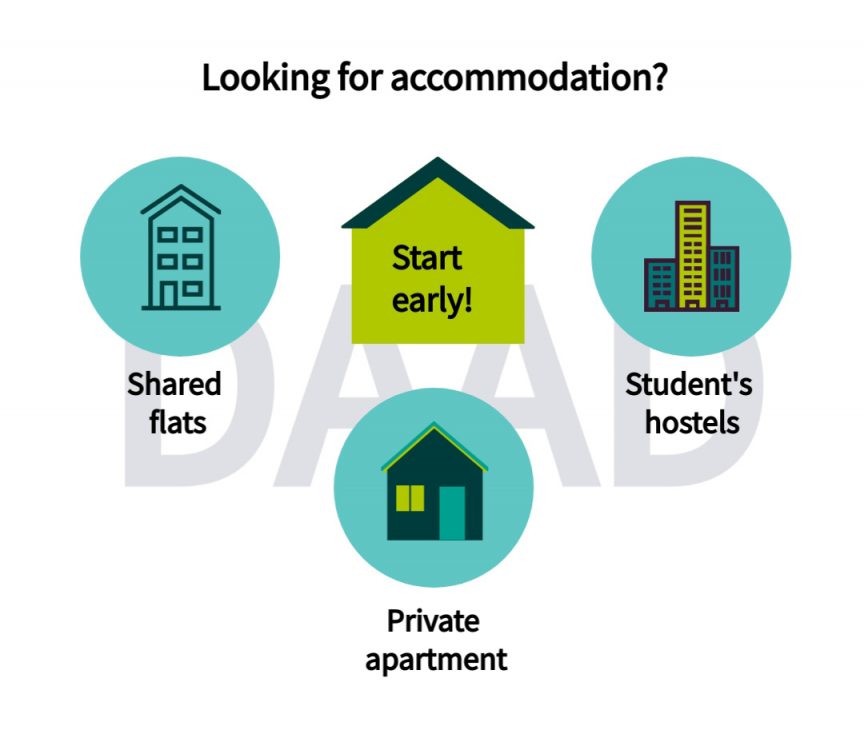
Your options are:
- Students’ Halls of Residence: Rooms here are provided by the Student Services Organisation (Studentenwerk) at your university. This kind of accommodation is extremely popular given its low cost and other advantages like internet connectivity and leisure activities that they offer. You quickly get to know your fellow students here. Studentenwerke also offer Service Sets (Servicepaket) for foreign students that include accommodation, meals, procurement of insurance, excursions etc. The price of the Servicepaket varies depending on the benefits included. There is only a limited number of Servicepakets available, so do get in touch with the responsible Studentenwerk in good time! You can find more information on www.internationale-studierende.de.
- Shared Flats (Wohngemeinschaft – WG): These are accommodations privately rented by students and shared. Normally everyone has an individual room in an apartment. Kitchen and bathroom as well as other utility rooms if any are shared, so are the rent, electricity, gas, water, internet etc. This arrangement certainly works out to be cheaper than living alone.
- Private Apartments: You may prefer to rent private rooms or flats. These can be found with the help of the accommodation services offered by the Studentenwerk, the notice boards in the university foyers, the accommodation files with the student council or union (AStA) and of course the local media.
At the time of renting any kind of accommodation, make sure that you completely understand the contract you are entering into with the landlord! Do ask what is covered in the rent. If it is the “Warmmiete” you are paying, it includes room heating and warm water, whereas the “Kaltmiete” does not cover these. Electricity is normally paid as per consumption. Take a good look at the apartment’s condition; you will be expected to return it in the same condition in which it was handed over to you.
Read to know more about renting accommodation.
Packing Bags
Packing wisely helps you in more than one way. You can save a lot of money and effort by finding out what is easily available in Germany and what is not!
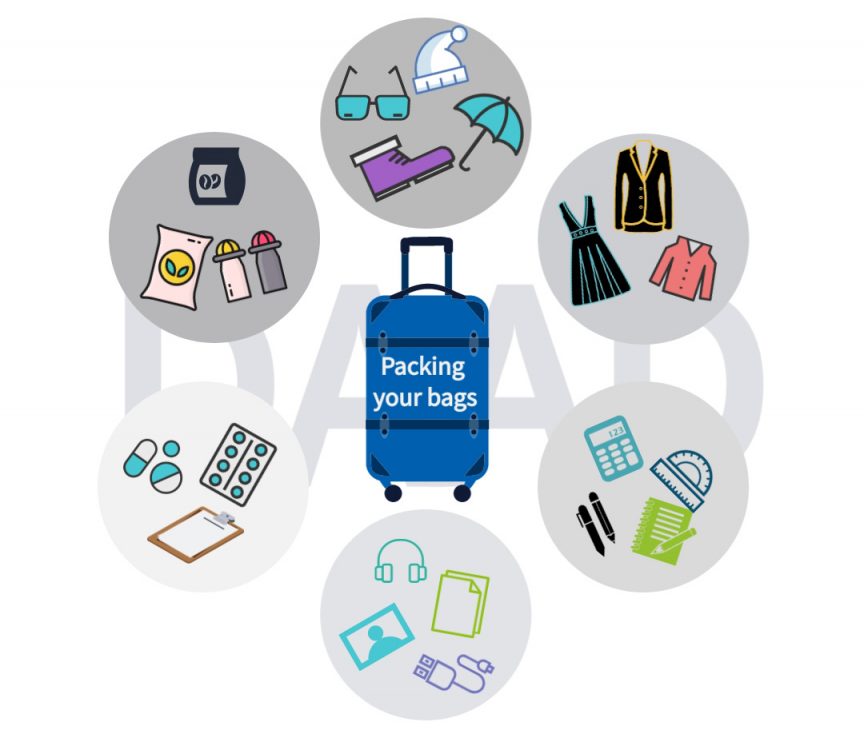
- Clothes: It gets really cold in Germany, so make sure that you have enough warm clothing to start with. Do carry some light clothing as well, for summers are pleasant and at times even rather warm! It is always nice to have the right kind of clothes for formal occasions and perhaps your traditional dress for special dos. It would also be a good idea to pack a raincoat and an umbrella.
Students housing and most shared apartments do have washing machines and you are bound to find some laundry shops (Waschsalon) that charge 3-6 Euros per wash load. So, it would suffice if you packed enough clothes just for the first few days. - Medicines: Do carry a set of your basic medicines. In case you have any special medical requirements, ensure that you have the necessary supplies at least for the initial days. As a precaution, have a physician’s prescription handy for all the drugs you are carrying.
- Bedding: Pack your blankets, bed linen and towels. Your accommodation, even if it is furnished, will not provide you with these.
- Documents and Cash: You will need to carry your passport, academic certificates, health-related papers etc. together with extra copies of these and some photographs. Carrying scanned copies of all these would also be a good idea. Keep some cash handy for the first few weeks – you will not only be spending on lodging-boarding and transport but also paying various deposits, advance rental etc.
Ensure the safety of these once in Germany. In case you lose your passport, you must immediately contact the Embassy of your country. - Other Items: This may include your laptop, chargers, mobile phones, and any specific gadgets and instruments you cannot do without! Germany mostly has two-pin sockets – so carry suitable adaptors. And perhaps also some of your special spices and favourite munch for your initial days!
Arranging the Travel
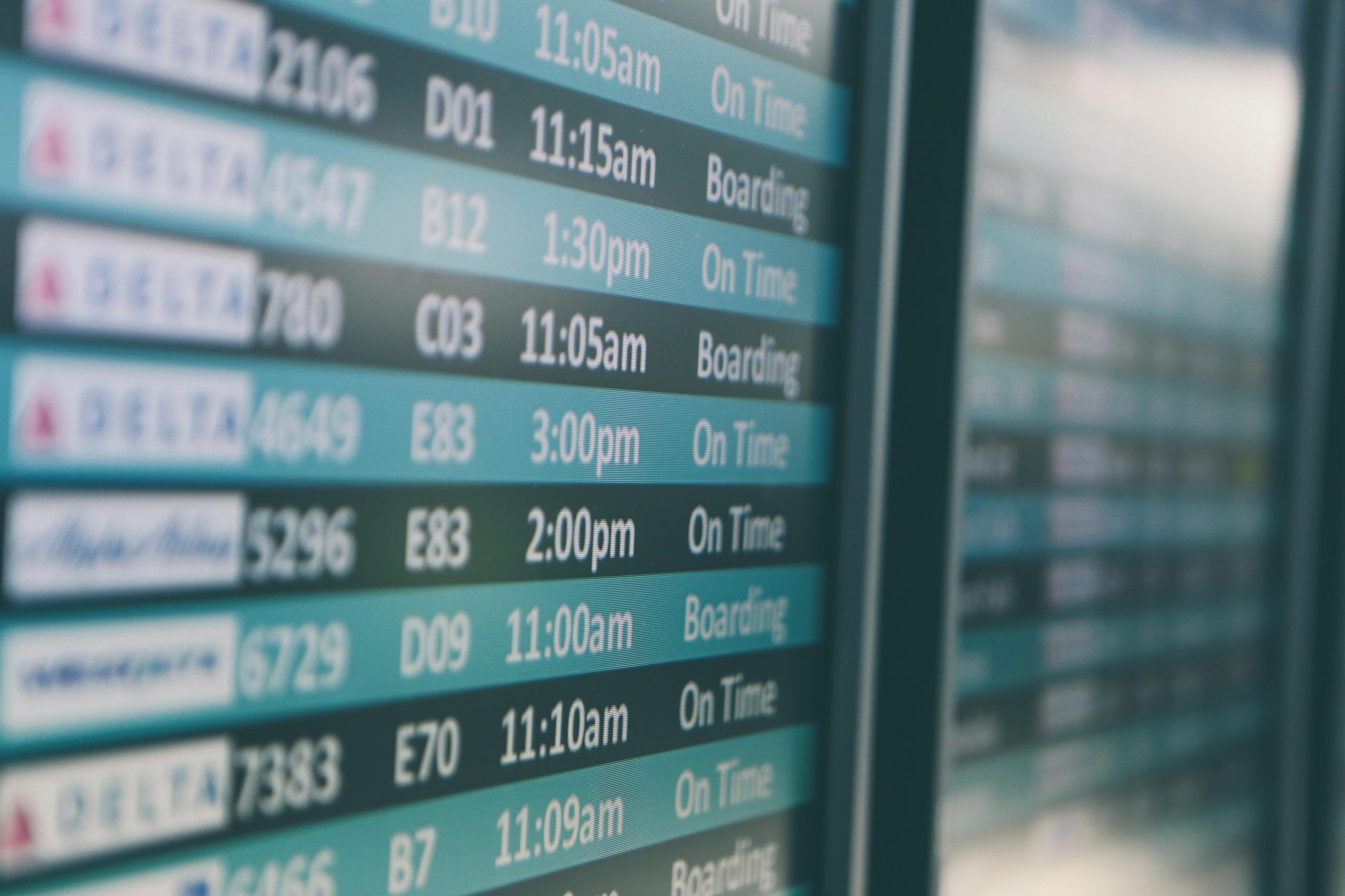
© Matthew Smith
The major international airports in Germany are Frankfurt, Munich, Hamburg and Dusseldorf. You can either take a connecting flight or a train to your town from there. Germany has an excellent railway network that connects all cities, however big or small. You can find the train schedule on the website of Deutsche Bahn and book tickets online using a credit card. Look out for special offers and discounts!
Reaching your university town during day hours will surely make things simpler for you. However, you can always stay at a youth hostel if you reach in the late hours. Some universities offer services like pick-up – do check them out!
Once in Germany
The formalities you need to take care of as soon as you are in Germany are your health insurance, registration at the university, extending your visa, and of course opening a bank account!
Procuring a Health Insurance

© iStock
While your overseas travel insurance was sufficient till you reached Germany, you cannot be enrolled at the university unless you have a German insurance. As a student, you are eligible for a public insurance till you reach 30 years of age. This will cost you around Euro 110 per month. You can opt for private insurance as well, but it will cost you more. The social help desk in the Studentenwerk or the International Office of your university can give you more information about insurance providers.
Read more about health insurance.
Registering at the University
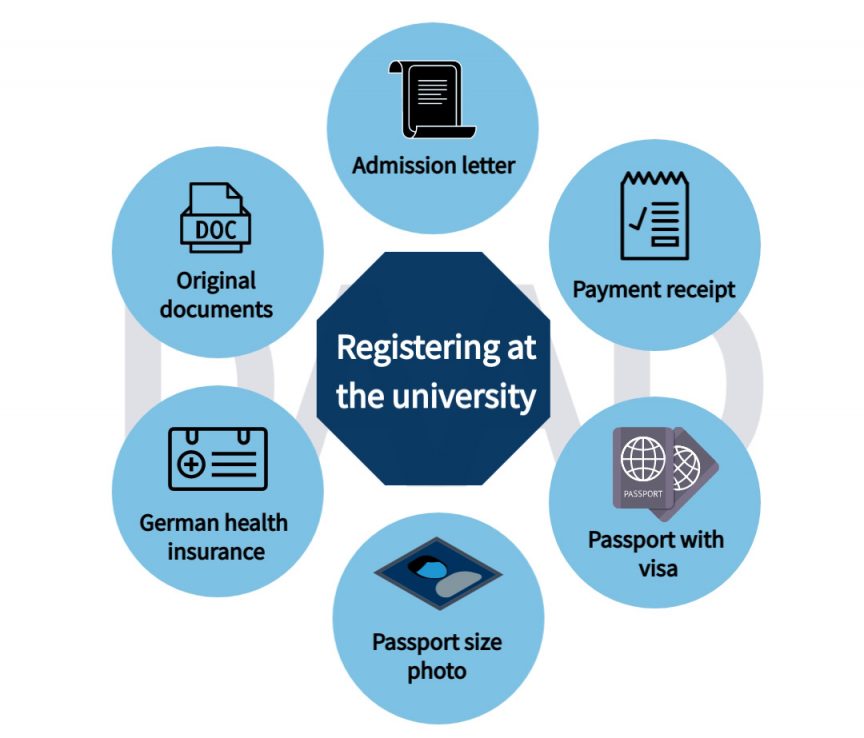
What you received in your home country was a letter of admission. What you need to do now in Germany is to enrol yourself formally at your university. Make sure of the exact dates of enrollment as they vary from university to university and late enrollment is generally not possible. Ensure that you have all the documents ready, which may include German health insurance, notification of admission, receipt of your payment to the Student Organisation, a passport-size photograph, your passport with visa/note of residence and possibly your original certificates among others.
After enrolment, you will receive confirmation of matriculation and a student ID card. This ID card might help you in getting discounts at cinemas, sports, newspaper subscriptions etc. – always keep it handy!
Getting a Residence Permit
As you have already applied for a long-term visa in your home country, it is time to apply for a residence permit. For this approach the Aliens Department/ Federal Foreign Office in your city of residence with the certificate of enrolment from the university, registration from the authorities, proof of accommodation, proof of finance, and valid German health insurance among others.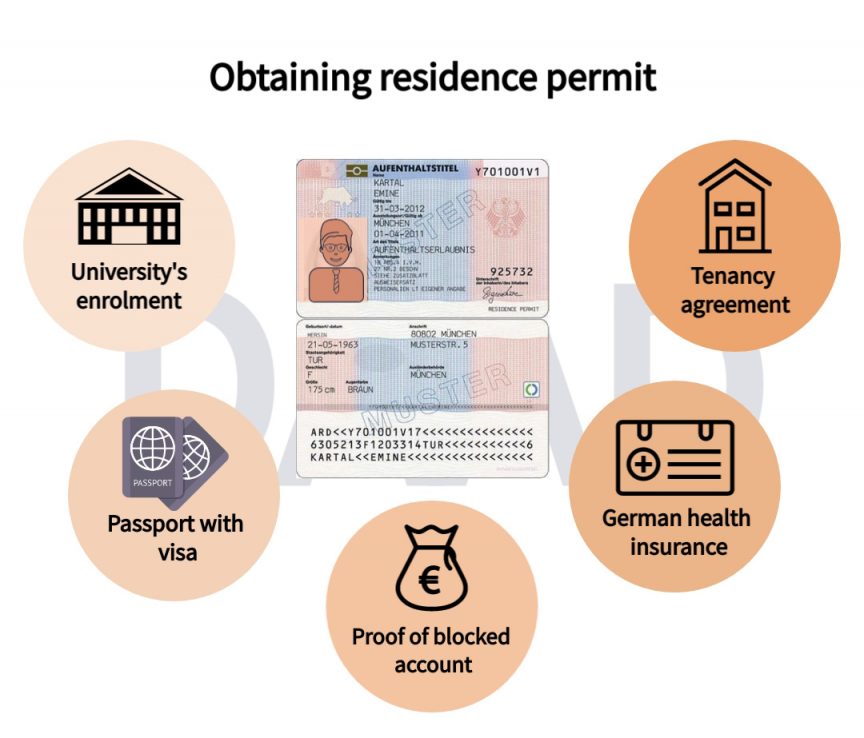 Just like the visa, a residence permit is granted for a specific purpose. International students can get a residence permit either as an applicant for a university place, as a participant in a language course or as a student. A residence permit for the purpose of studying is issued for a period of two years and must always be extended before the two years run out. The extension depends on how you conduct your studies, i.e. whether you take examinations and obtain certificates.
Just like the visa, a residence permit is granted for a specific purpose. International students can get a residence permit either as an applicant for a university place, as a participant in a language course or as a student. A residence permit for the purpose of studying is issued for a period of two years and must always be extended before the two years run out. The extension depends on how you conduct your studies, i.e. whether you take examinations and obtain certificates.
Opening a Bank Account
Your bank account will make organising monthly payments such as rent and insurance easier for you. Most banks offer current accounts free of charge for students.
In Germany, people tend to pay in cash – especially for small amounts. Credit cards are relatively widespread but are not often used for everyday purchases. On the other hand, payment by cash card is very common.
Life in Germany
Arrived and settled, now is the time to take care of things that add value to your life – in matters of food, communication, leisure… there is always more to it!
All about Food
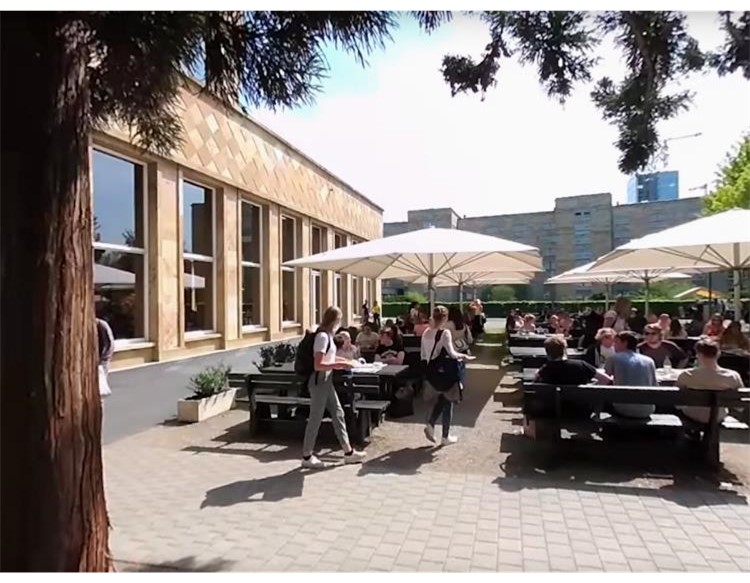
© iStock
As a student in Germany, you are not likely to have the luxury of a “hostel-mess” that serves almost four warm meals a day! You will find yourself eating your lunch at the university “Mensa” or cafeterias. For other meals of the day, you may check out the snack bars or “Imbiss” that serve international food and are often located near the city centre. And of course, you will always have access to a shared kitchen whether you are staying at the students’ hall of residence or in a WG. You will find lots of cafes and restaurants in Germany serving different kinds of cuisine, including south Asian. It is normal to leave a tip at such places and at bars or for taxi drivers.
Groceries and daily necessities can be bought from a whole range of pocket-friendly supermarkets in every city. You can also easily buy Asian products at “Asia-Shops”. When you set out for shopping, do ensure that you carry a shopping bag with you, otherwise you will have to buy one! Also, most bottled beverages attract the so called “Pfand” which is a refundable deposit of about 8–25 cents. You will not have to buy bottled water as you can drink regular tap water unless it explicitly says “Kein Trinkwasser”
Communication Needs
- Telephone: Germany operates on GSM network, so the phone you use in your country is very likely to work in Germany. You can easily buy prepaid cards for your cell phone (or “Handy” as it is called there) from phone shops as well as supermarkets and drug stores. There are many providers in Germany: do check out what kind of deals they are offering before investing, at times handsets come free with certain connections.
- Internet: All student housing facilities and most shared apartments have paid internet. You can also use computer pools in the university. Internet cafes in Germany charge on an hourly basis and can be expensive.
Leisure Activities
While studying in Germany is a serious business, it does give you some leisure time. The Office of Student Affairs and Studentenwerk often offer evening activities like cinema, theater, workshops as well as excursions.
“Freundeskreis” i.e., groups of DAAD alumni offer leisure activities as well, which you can check out. Theatres and museums offer students discounts, so remember to carry your students ID card all the time with you. It is also a safety precaution and can come in handy in times of emergency of any kind.
And needless to say, Germany is heaven for sports-buffs!
Travelling and Commuting

For commuting within the city, bus, metro or bicycle would be your best bet. If you are dependent on public transport, make sure that you check the timetables well as the frequency of buses/metros is low during late hours and on holidays like Christmas. Be prepared to walk a lot when in Germany. autorickshaws or tuk-tuks are not available there and taxis are rather heavy on the pocket.
Travelling by train in Germany is usually quick and convenient. Tickets for fast trains such as the Intercityexpress (ICE), Intercity (IC) or Eurocity (EC) are more expensive than the tickets for local trains. Local train services include the Interregio (IR), the Regional Express (RE) and the Regionalbahn (RB).
If you take the train frequently, consider purchasing a BahnCard. The card entitles you to a discount of 25, 50, or 100% off the normal fare, depending on which card you purchase. There are also many special offers, such as weekend tickets, which allow up to five people to travel on local transport for a whole day at the weekend. Another offer is the Quer-durchs-Land-Ticket. This allows you to travel with up to four friends for a day on all regional trains across Germany. You can find information about train connections as well as special offers on the website of Deutsche Bahn
You may also want to check out the availability of low-cost airlines.
Additional Tips
The trick is to know more – about people, about places, about the thought that goes behind actions!
Learn from the Experiences of others
- Connect with DAAD Young Ambassadors who have studied or are studying in Germany. Checkout the videos series in which the Young Ambassadors share their insights about students’ life in Germany.
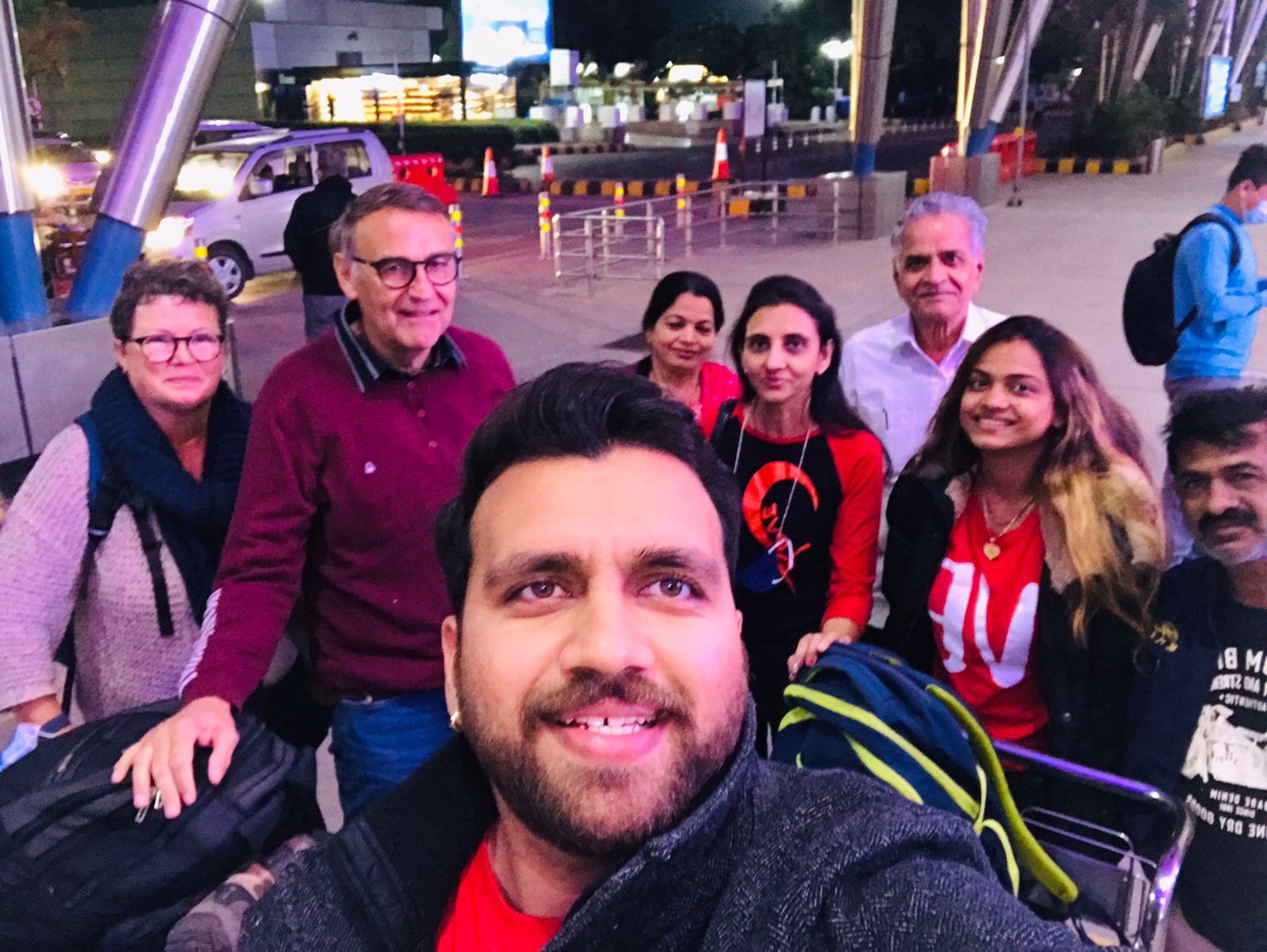
© PalakLakhani
- You can even check out other students’ blogs, videos etc. on the website of Study in Germany
- Get in touch with students’ association of your country.
Know the Place where you are going to be
- Visit the website of your city in Germany for information about weather, tourism, life etc.
- Check website of your university for information about the campus and offers for international students.
- To find out about people of Germany and their ways and perspectives on different topics you can go to the Goethe-Institut website.
Download
Keep this information handy!